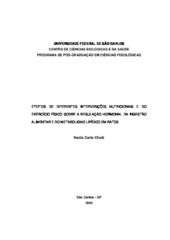Efeitos de diferentes intervenções nutricionais e do exercício físico sobre a regulação hormonal da ingestão alimentar e o metabolismo lipídico em ratos
Resumen
The prevalence of obesity is increasing worldwide, indicating
that environmental and behavioral aspects play an important causal role.
Among the environmental influences, the percentage of fat energy in
everyday diet and the lack of physical activity are two important factors, so
the mechanisms that control food intake and body weight are essential in
public health. The adipose tissue is regulated by several hormones and
neuropeptides. Two of these, the circulating peptide hormones leptin and
ghrelin, have actions that include reciprocal effects on appetite-regulating
neurons in the hypothalamus. This study aimed to observe whether the
effects of continuos fedding with a palatable hyperlipidic diet and cycling this
diet with a chow one and also entends to design the effects of exercise on
these diet regimens.The animals (rats) were assigned to six differents
experimental groups:sedentary rats fed with chow diet(SP); exercised rats fed
with chow diet(TP); sedentary rats fed with a palatable hyperlipidic diet(SH);
exercised rats fed with a palatable hyperlipidic diet(TH); sedentary rats fed
with food cycles, alternating weekly the chow diet wih hyperlipidic one(SC);
and exercised rats fed with food cycles(TC). The data showed that the two
hyperlipidic diet regimens significantly increased RET and EPI weights, area
and diameter of adiposity cells, promoted hyperinsulinemia, hyperleptinemia
and decreased significantly lipogenesis rate in RET and EPI, showed also
percentual reduction in ghrelin levels, but didn t affect the lipolysis rate. In
addition, the present investigation showed that chronic exercise decreased
body weight gain and adiposity and attenuated insulin, leptin levels in both
high-fat feeding regimens, also reduction in ghrelin levels in TP and
increased the lipolysis rate under all regimens, excepting in food cycle
treatment. Results suggest that diet and exercise affected serum levels
anorexigenic and orexigenic hormones and the lipid metabolism.
